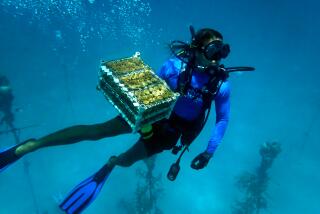No-coral campaign leads to faux coral jewelry
Along with ivory and conflict diamonds, the jewelry aficionado now has another exploited treasure from which to refrain: sea coral, which is finding itself under attack worldwide.
In 2007, SeaWeb, an ocean conservation nonprofit based in Maryland, teamed up with the Tiffany & Co. Foundation for Too Precious to Wear, a campaign that advocates against using coral in jewelry, fashion and home decor. (Tiffany stopped selling coral jewelry in 2002.)
âWe want people to celebrate the beauty of the ocean, rather than pull life from [it],â says Dawn Martin, executive director of SeaWeb.
Corals are living animals â not rocks or plants as many believe â and their vibrancy dictates the actual health of the ocean, which, in turn, helps dictate the health of the planet. The beautiful creatures are among the most complex ecosystems and are home and the nursery grounds to more than 4,000 different species of fish, in addition to thousands of other plants and animals. They also provide medical compounds used in some cancer drugs as well as in AZT, which is used to treat HIV infections.
Martin says coral reefs, which can take hundreds and sometimes thousands of years to build, can even protect coastal communities from natural disasters, something on the rise with climate change. A study of the 2004 South Asia tsunami showed how the presence of healthy coral could have reduced the tsunamiâs effects by 50%. In areas of Sri Lanka with a history of heavy coral mining, the tsunami had higher waves, reached farther inland and resulted in more severe damage. Nearby areas with healthy reefs showed significantly less damage.
But today corals are endangered by climate change and by human actions, such as deep sea trawling for fish.
The campaign to forgo using live coral in fashion is supported by designers including Lilly Pulitzer, Nicole Miller, Norma Kamali, Anthony Nak, Frank Gehry, Melissa Joy Manning, Kimberly McDonald, Jennifer Meyer, Monique Péan, Paloma Picasso, Jean Schlumberger and Temple St. Clair. All have pledged to avoid real coral and replace it with simulated substitutes such as glass, resin, metal or wood to create products that are often indistinguishable from the real animal.
âAs a designer who creates with a conscience and a reverence for the natural materials I use, I canât understand why anyone would work with coral still,â says jewelry designer Kimberlin Brown, another who took the pledge. âOnce you know itâs an endangered living creature that belongs in the ocean, not around our necks, it seems easy. Like ivory, it takes educating people; coral will be similar and become taboo as well.â
âWeâre not yet where the fight against ivory poaching is, but we started 32 years later,â Martin says. âThereâs a lot at stake â the literal health of our oceans and planet â and itâs not a wait-and-see situation. We must protect these animals.â






